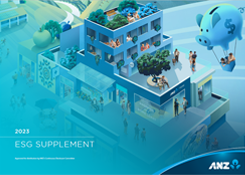Fraud protection.
Now it’s personal.
ANZ Falcon® technology monitors millions of transactions every day to help keep you safe from fraud.
Falcon® is a registered trademark of Fair Isaac Corporation.
Our suite of ESG reports are produced to meet the needs of our key external stakeholders, including our investors and customers, and take account of our social, environmental and economic risks and opportunities.
We're committed to transparent and regular performance reporting using key sustainability reporting frameworks, including the GRI Standards and TCFD.

This report provides detailed information on ANZ's focus on bringing our purpose to life through helping tackle significant societal challenges that are core to our business strategy and matter to society.
2023 ANZ ESG Data and Frameworks Pack
Summarises our progress on key ESG metrics for financial year 2023 and incorporates our United Nations Guiding Principles Reporting Framework and Global Reporting Initiative Standards Content Index.
We report using the recommendations of the Financial Stability Board Taskforce on Climate-related Financial Disclosures (TCFD).
ANZ's Social and Environmental Sustainability Target Methodology. Released 13 November 2023.
Parts of our Annual Report draw on aspects of the International Integrated Reporting Framework to describe how we deliver value for our Stakeholders.
The 2023 Annual GHG Emissions and Carbon Offset Data Assurance Statement details our global carbon offset data, done by KPMG. Released 31 October 2023.
Transitioning our lending portfolio to net zero financed emissions by 2050 in line with the goals of the Paris Agreement: Our approach to Institutional energy customers. Released 9 July 2024.
Our modern slavery program focuses on building awareness, improving policies and processes, and undertaking due diligence across our business operations and supply chain.
The S&P CSA measures the ESG performance of companies. It has become a key benchmark for investors who integrate sustainability into their portfolios. In January 2024, ANZ achieved a score of 77/100 which places us in the top 3% for S&P Global ESG Scores.
Sustainalytics' ESG Risk Ratings measure a company's exposure to industry-specific material ESG risks and how well a company is managing those risks. In 2023, ANZ received an ESG Risk Rating of 18.9 out of 100 (a lower score is more desirable) and was assessed by Sustainalytics to be at low risk of experiencing material financial impacts from ESG factors.
We became a member of CDP in 2007 and respond to the CDP climate change program, which is an annual study of the greenhouse emissions and climate change strategies of the world's largest companies. In 2022, we achieved a CDP climate change score of A-.
FTSE4Good reviews publicly available information on listed companies, and screens for performance against environmental, social and governance standards. ANZ has been a constituent of the FTSE4Good Index since 2001.
The annual MSCI Global Sustainability indices include companies with the highest environmental, social and governance ratings relative to their peers. ANZ is included in the MSCI Global Sustainability Indices. In 2023, ANZ received a rating of AA (on a scale of AAA-CCC) in the MSCI ESG Ratings assessment, up from A in 2020.
ISS Corporate ESG Rating's assessment of a company's management of ESG issues is analysed on the basis of up to 100 rating criteria, with most of them sector specific. ANZ holds Prime status with a rating of C (on a scale of A+ to D-) in the ISS ESG Corporate Ratings assessment (February, 2022). Prime status is awarded to companies with an ESG performance above the sector-specific Prime threshold, which means that they fulfil ambitious absolute performance requirements.
ANZ is one of the organisations awarded the Employer of Choice for Gender Equality citation in 2019 by the Australian Government’s Workplace Gender Equality Agency.
GoodCompany.com.au is Australia's largest unified workplace giving, volunteering and fundraising platform. In 2022 ANZ was recognised as one of the Top 20 Best Workplace to Give Back in Australia and maintained our #1 position in the large employee category.
ANZ is a founding signatory to the UNEP FI Principles for Responsible Banking (the Principles). The Principles provide a single framework that embeds sustainability at the strategic, portfolio and transactional levels and across all business areas, aligning banks with society’s goals as expressed in the Sustainable Development Goals and the Paris Climate Agreement.
We became a signatory to the UN Global Compact in 2010. Each year we complete a “Communication on Progress” which details our approach to performance against the Compact’s 10 principles in the areas of human rights, labour, environment and anti-corruption.
In 2016, we became a signatory to the Women's Empowerment Principles, a partnership initiative of UN Women and UN Global Compact (UNGC), to provide a set of considerations to help the private sector focus on key elements integral to promoting gender equality in the workplace, marketplace and community.
UNEP FI is a partnership between UNEP and the global financial sector to mobilise private sector finance for sustainable development. UNEP FI works with more than 350 members – banks, insurers, and investors to help accelerate sustainable finance. ANZ has been a member since 2003.
Since 2005, we've measured our community investment in accordance with the Business for Societal Impact (B4SI) Framework, a global standard for measuring and managing social impact. In 2022, our community investment was AUD $136.4 million. In addition, we facilitated more than AUD $22.2 million in donations to community organisations through our employees, customers, shareholders, other partners and the general public.
![]()
You need Adobe Reader to view PDF files. You can download Adobe Reader free of charge.